Today’s topic follows a recent Vox article on a weird, drug-related cultural phenomenon: The newfound popularity of ayahuasca ceremonies.
Why are so many men doing ayahuasca?
From Aaron Rodgers to Industry, this psychedelic brew is having a cultural moment with dudes– here’s why.
The article’s subjects– described as a collection of “wealthy dudes who are obsessed with self-improvement and rely on their own “research” to an often troubling degree”– extoll the value of the drug, but in the language of commercial enterprise– especially Silicon Valley– rather than spirituality.
Think: Increased productivity, ability to lead others, and ultimately of course, spectacular monetary success.
It isn’t easy to see a link between the two. What is it about having consumed hallucinogenic tea in a remote forest clearing, spending a few hours vomiting, hallucinating, and finally, alternating between euphoria and panic, that could possibly make the user a better, more effective corporate leader?
Any more than it appears to have made Aaron Rodgers a better quarterback (ask a Jets fan).
It just doesn’t compute. I could see someone convincing themselves that it made sense, however, based on some combination of hope and confirmation bias.
Of course, maybe it’s me who lacks vision. Or hallucinogenic tea.
The article suggests that the unexpected popularity of ayahuasca ceremonies stems more from a dude’s desire to belong to an ‘in-group’ of successful people than to a genuine quest for self-knowledge. In other words, their motives are mostly narcissistic in nature — a way of feeding one’s ego needs, such as:
- An inflated sense of self-importance or privilege
- A desire to feel special, above others
- Fantasies of attaining success, power, attractiveness
- Old fashioned intellectual arrogance
Examples of narcissism abound in today’s media-driven cultural environment. After all, true narcissists do tend to attract attention.
I suppose that’s the point, isn’t it?
It would be different IMO if the ‘ayahuasca bros’ were seeking enlightenment or therapeutic benefits from the experience. For instance, I’ve met perfectly competent mental health professionals who are convinced such experiences can be a valuable tool in their work with victims of trauma. I admit I’m skeptical, but at least they have a worthwhile purpose in mind.
The “bro” culture, to me, is something different. It’s ultimately about self-indulgence, not self-knowledge.
And we know where that leads.













